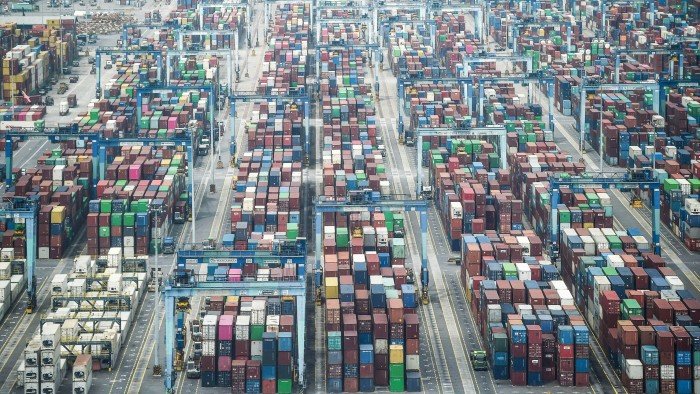Unlock the Editor’s Digest for free
Roula Khalaf, Editor of the FT, selects her favourite stories in this weekly newsletter.
Chinese exporters are stepping up efforts to avoid tariffs imposed by US President Donald Trump by shipping their goods via third countries to conceal their true origin.
Chinese social media platforms are awash with adverts offering “place-of-origin washing”, while an inflow of goods from China has raised alarm in neighbouring countries wary of becoming staging posts for trade actually destined for the US.
The growing use of the tactic underlines exporters’ fears that new tariffs of up to 145 per cent imposed by Trump on Chinese goods will deprive them of access to one of their most important markets.
“The tariff is too high,” said Sarah Ou, a salesperson at Baitai Lighting, an exporter based in the southern Chinese city of Zhongshan. “[But] we can sell the goods to neighbouring countries, and then the neighbouring countries sell them on to the United States, and it will reduce.”
US trade laws require goods to undergo “substantial transformation” in a country, usually including processing or manufacturing that adds significant value, to qualify as originating there for tariff purposes.
But adverts on social media platforms such as Xiaohongshu offer to help exporters ship goods to countries such as Malaysia, where they will be issued with a new certificate of origin and then sent to the US.
“The US has imposed tariffs on Chinese products? Transit through Malaysia to ‘transform’ into Southeast Asian goods!” said one advert posted this week on Xiaohongshu by an account under the name of “Ruby — Third Country Transshipment”.
“The US has set limits on Chinese wooden flooring and tableware? ‘Wash the origin’ in Malaysia for smooth customs clearance!” it added. A person contacted through the details supplied in the advert declined to comment further.

South Korea’s customs agency said last month it had found foreign products worth Won29.5bn ($21mn) with falsified countries of origin in the first quarter of this year, most of them coming from China and almost all destined for the US.
“We are seeing a sharp increase in recent cases where our country is used as a bypass for products to avoid different tariffs and restrictions because of the US government’s trade policy changes,” the agency said in a statement. “We have found numerous cases where the origins of Chinese products were falsified as Korean.”
Vietnam’s industry and trade ministry last month called on local trade associations, exporters and manufacturers to strengthen checks on origins of raw materials and input goods and to prevent the issuing of counterfeit certificates.
Thailand’s foreign trade department also last month unveiled measures to tighten origin checks on products bound for the US in order to prevent tariff evasion.
Ou of Baitai said that, like many Chinese manufacturers, the company shipped goods as “free on board”, under which buyers took liability for products once they left their departure port, reducing the legal risk for the exporter.
“Customers only need to find ports in Guangzhou or Shenzhen, and as long as [the goods] go there, we have completed our mission . . . [after that] It’s none of our business,” she said.
Salespeople at two logistics companies said they could ship goods to Port Klang in Malaysia, from where they would move items into local containers and change their tags and packaging. The companies had connections with factories in Malaysia that could help issue certificates of origin, said the salespeople, who declined to be named.
“The US must know of it,” said one. “It cannot get too crazy so we are controlling the amount [of orders we take].”
“They [Malaysian customs] are not very strict,” the other salesperson said.
China’s foreign and commerce ministries, and the Malaysian government, did not immediately respond to requests for comment.
A consultant who advises companies on cross-border trade said origin-washing was one of the two main methods being employed to avoid Trump’s new levies. The other was mixing high cost items with cheaper goods, so exporters could falsely claim a lower overall cost of shipments, the consultant said.
The owner of a consumer goods manufacturer based in the southern Chinese city of Dongguan said two domestic industry associations had introduced it to intermediaries who offered “grey area” tariff workarounds.
“Basically I only ship to a Chinese port and they take it from there,” the owner said, adding that the intermediaries had offered to arrange the workaround for just Rmb5 ($0.70) per kilogramme shipped.
“These agencies said small- and medium-sized enterprises like us can weather the tariff hit better because there’s always grey areas,” she said. “I hope it’s true. The US is a big market — I don’t want to lose it.”
The proliferation of efforts to avoid tariffs has caused concern among US business partners. One senior executive at a top 10 independent seller on Amazon said they had observed instances where shipments’ origins had been altered, risking confiscation by US customs authorities.
The executive said they were reluctant to accept offers of assistance from their Chinese suppliers, such as having them act as the “importer of record” into the US and paying tariffs based on the cost of manufacturing rather than the retailer’s higher cost of purchase.
The executive said they worried that a supplier might report a false value. “You’re putting a lot of trust in a Chinese supplier,” they said.
